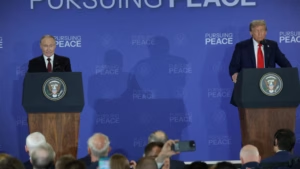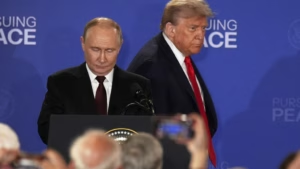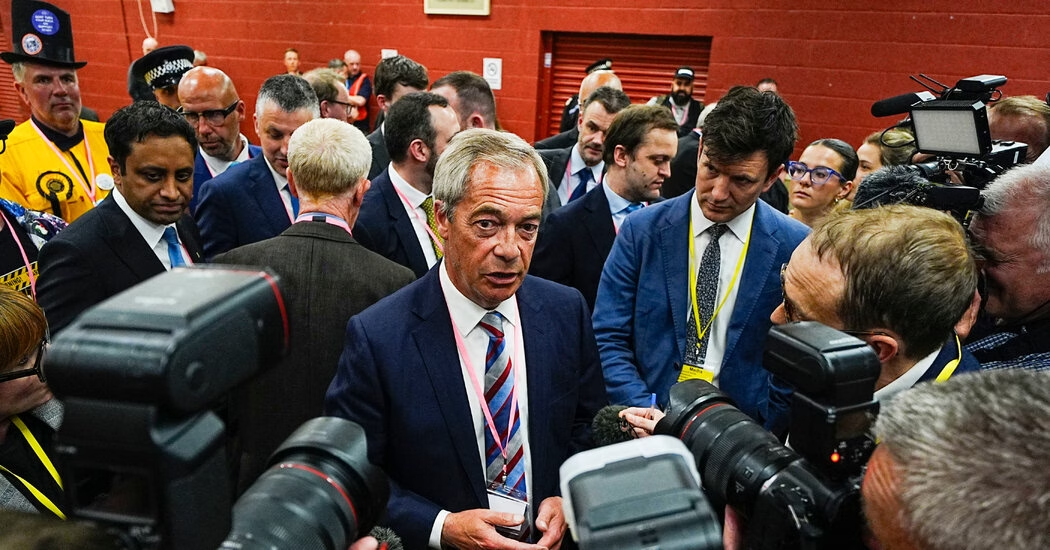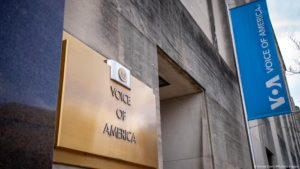Reform U.K., an anti-immigration political party led by Nigel Farage, secured a dramatic victory in a specially called parliamentary election, winning hundreds of seats in local governments in England. This win represents a first step for the party in gaining power at lower levels of government.
By achieving significant gains in a set of local elections held in England on Thursday, Nigel Farage, one of the United Kingdom’s most well-known supporters of former U.S. President Donald Trump, consolidated his standing as the country’s leading political disruptor.
Moreover, he may have dealt a significant blow to the country’s two-party political system.
For nearly a century, power in Britain has shifted between the governing Labour Party, led by Prime Minister Keir Starmer, and the opposition Conservatives, who recently elected a new leader, Kemi Badenoch.
However, the surge in support for Reform and other smaller parties has made the duopoly of the Conservative and Labour parties look more fragile than ever.
“The two major parties have been warned that they could be evicted from their century-long tenures at Downing Street,” said Robert Ford, a professor of political science at the University of Manchester.
Following their removal from power last year, the Conservatives suffered another devastating set of results. With the economy stagnating, Labour faced punishment from voters angry about government spending restrictions and higher taxes imposed since their rise to power.
The electorate rejected both main parties, according to Professor Ford, who added that, if such results occurred in a general election, “the Conservative Party would cease to exist as a significant force in Parliament.”
Claire Ainsley, a former policy director for Mr. Starmer, noted that the results also reflected longer-term trends, including the breakdown of traditional class loyalties among voters, the increasing pull of nationalist politics, and growing support for the centrist Liberal Democrats, the Greens, and independent candidates.
“We have been observing the fragmentation of society, and that has been reflected in our politics,” said Ms. Ainsley, who now works in the U.K. for the Progressive Policy Institute, a research institute based in Washington. “There is now multiparty voting,”
The consequence is that both major parties are struggling as they compete not only with each other but also with opponents on their left and right.
This discontent among the public gave an opportunity to smaller parties including the Liberal Democrats, who won 163 council seats, and the Greens, who gained 44. But the biggest beneficiary was Reform, whose supporters have been energized by Mr. Farage’s aggressive campaigning.
In an interview at a Reform U.K. rally in March, John McDermottroe, a party supporter, indicated that many people in his region of Stockton-on-Tees, in northeastern England, felt that the Labour Party had “moved away from working people.”
As for Mr. Farage, “he is very charismatic, he communicates with people from every stratum of life, he speaks the truth,” Mr. McDermottroe said.
The fragmentation that Mr. Farage unleashed in British politics was felt even in races that Reform lost, including the mayoralty of a region known as the West of England.
Helen Godwin of Labour won that with just a quarter of the vote, edging slightly ahead of Reform U.K., while even the fifth-placed party won 14 percent of the vote.
Fewer than one-third of eligible voters cast a ballot, the usual low turnout for local elections. But that meant Ms. Godwin was elected by just 7.5 percent of eligible voters, noted Gavin Barwell, a former chief of staff in Downing Street and member of the opposition Conservative Party on social media, adding that there was a “collapse” of the two-party political system.
That may yet prove an overstatement.
Due to a reorganization, the number of seats up for grabs in Thursday’s local elections was the smallest since 1975, and voter turnout is always low in such races.
Britain’s next general election — when this proposal will be truly tested — does not have to be held until 2029, and previous challenges to two-party dominance have faded.
In the early 1980s, the Social Democratic Party, founded by disenchanted moderates from the Labour Party, promised to “break the mold” of British politics. In alliance with another centrist party, it briefly topped 50 percent in an opinion poll. But that proved a false dawn.
However, with five parties now vying for votes in a system that favored two, British politics has become deeply unpredictable.
Born from the trade union movement, Labour was once the party of the working class, with its strongholds in the industrial north and middle of the nation. Traditionally, the Conservatives represented the wealthy and middle classes, their support concentrated primarily in the south.
The loosening of these ties had already weakened the grip of the two main parties. In last year’s general election, the combined vote for Labour and the Conservatives dipped below 60 percent for the first time since before 1922, and Labour’s landslide victory was achieved on just about 34 percent of the vote.
In Scotland, the pro-independence Scottish National Party has reshaped politics.
Mr. Starmer now faces a dilemma: If Labour shifts to the right to appease Mr. Farage’s sympathizers, it risks losing support from its progressive base to the Liberal Democrats or the Greens.
Ms. Ainsley stated that Labour faces “an enormous challenge” due to the limited government spending, but emphasized that it must focus on delivering for voters who continue to suffer from an increase in the cost of living.
The Conservatives face an even greater threat from Reform, as well as their internal challenges. They need to recapture the voters who have switched to Mr. Farage without moving so far to the right that they push more liberal Conservatives towards the centrist Liberal Democrats.
Political scientists also suggest that a transformation is underway that could alter the fortunes of Reform, shifting it from a protest party to a force capable of realizing its ambition to replace the Conservatives as the leading opposition party.
Britain’s parliamentary elections operate under a “first past the post” system, in which the candidate who receives the most votes in each of the 650 constituencies is elected. So far, this system has typically disadvantaged smaller parties.
“When it was only the Liberal Democrats trying to break the Labour-Tory duopoly, a rule of thumb was that they, and their predecessor parties, needed at least 30 percent to overcome the inherent shortcomings of first past the post,” wrote Peter Kellner, a polling expert.
With more parties in the running and no dominant force, the calculations are changing. “The tipping point for a party such as Reform is no longer 30 percent. It is probably around 25 percent. That is where they currently stand in the polls,” he added.
Professor Ford agreed that something fundamental was shifting and that Reform was now “doing well enough for first past the post to stop being their enemy and to become their friend.”
Following the latest election results, Professor Ford noted, “it is now much easier for Nigel Farrage to claim ‘We are the authentic opposition party,’ and harder for others to dismiss the claim.”





